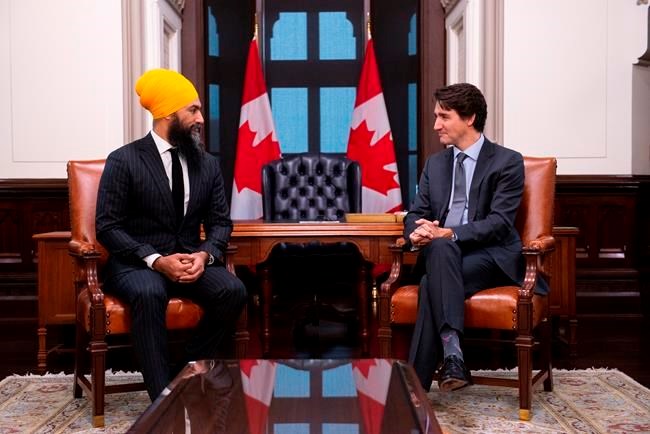OTTAWA — The federal government is looking to help Canadian families feeling the pinch of inflation without contributing further to the problem, the prime minister said Wednesday as his government rejected a call from the NDP to hike GST rebates and the Canada Child Benefit.
NDP Leader Jagmeet Singh wanted the government to double the GST rebate and add $500 to every Canada Child Benefit as inflation continues to rise.
Statistics Canada reported Wednesday that the consumer price index rose 6.8 per cent in April, the highest monthly increase since January 1991. Overall food costs rose 8.8 per cent, and gasoline, stimulated by the effects of the Russian invasion in Ukraine, soared 36 per cent, compared to April a year earlier.
"Salaries have only gone up by 3.3 per cent," Singh said during question period. "All of this to say, workers are experiencing a massive pay cut all the while oil and gas companies are enjoying massive profits. The prime minister can do something instead of just standing by."
Singh wants Prime Minister Justin Trudeau to fund the benefit increases by redirecting a $2.6-billion tax credit promised in the recent budget to help companies build carbon capture and storage systems. Most of that would likely go to oil and gas companies, and the NDP says it is a massive subsidy to companies that are making record profits because of the same soaring gas prices harming Canadian families.
The NDP brought an opposition day motion this week seeking support from other parties for the idea. They only got that support from the Bloc Québécois, as the Liberals and Conservatives both voted against the motion Wednesday afternoon.
Earlier in the day, Trudeau said the GST rebate and Canada Child Benefit are already indexed to rise each year by the annual rate of inflation.
For help to families, he instead repeated his claim that the national child care deals Ottawa signed with provinces are saving families thousands this year.
"I was in Newfoundland and Labrador yesterday to highlight the fact that families in Newfoundland are going to save about $5,000 this year because of what we've done on child care," he said. "We continue to look for ways to support families without adding to the inflationary pressures in the economy."
The government is benefiting from inflation in increased GST revenues, collecting $42.2 billion between April 2021 and February 2022, compared with $27.3 billion in the same period in 2020-21, and $36.4 billion in that 11-month period in 2019-20.
The 2020-21 revenues were affected by COVID-19, as gas prices fell and people stayed home.
The GST rebate this year is set to rise to $306 per adult, up $7 from last year, reflecting an annual inflation rate of 2.4 per cent. Children will get $161, up $4 from 2021.
The maximum Canada Child Benefit is rising $114 to $6,997 this year.
Inflation from 2022 won't be reflected in those benefits until 2023.
The Liberals did give a one-time GST rebate top up in April 2020 and to the child benefit in May 2020, when the pandemic was in its early days and millions of Canadians were losing their jobs or seeing their hours cut back.
About 12 million people receive the GST rebate and 6.4 million Canadian children qualify for the child benefit.
The NDP did not say how much the proposed benefit hikes would cost. The Liberal budget included just $35 million for the carbon capture tax credit in this fiscal year. The $2.6 billion cost cited is spread over five years with more than half not expected to be spent until 2026-27.
The carbon capture and storage tax credit is a significant disagreement between the Liberals and the NDP, which formed a confidence and supply deal earlier this year to maintain the minority Liberal government until 2025.
The NDP agreed to support the Liberals on major confidence votes that could defeat the government and force an election, in exchange for action on certain issues including following through on the long-promised elimination of fossil fuel subsidies.
Singh maintained from the start the agreement did not mean the NDP would support the government in everything and said this week this tax credit and environmental policy are places of major disagreement.
The NDP maintain the carbon capture credit is a massive subsidy to the oil sector, while the Liberals say the promise was to eliminate only inefficient subsidies that helped companies pollute more.
Carbon capture and storage is a relatively new — and mostly unproven — technology to capture greenhouse gas emissions at their source and store them again underground.
The Liberals say the tax credit is not an inefficient subsidy.
This report by The Canadian Press was first published May 18, 2022.
Mia Rabson, The Canadian Press



